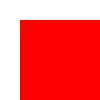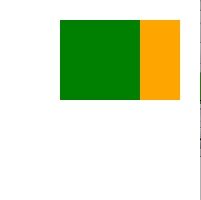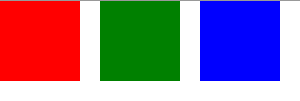使用案例 - QML 中的定位器和布局
在 QML 中有多种方式可以对项目进行定位。
以下是简要概述。更多详情请参阅 Qt Quick 重要概念 - 定位。
手动定位
可以通过设置其 x,y 属性,将项目放置在屏幕上特定的 x,y 坐标位置。这将根据 视觉坐标系 规则,根据其父元素的左上角来设置它们的位置。
结合使用 绑定 而不是常量值来设置这些属性,也可以通过设置 x 和 y 坐标来轻松实现相对定位。
import QtQuick Item { width: 100; height: 100 Rectangle { // Manually positioned at 20,20 x: 20 y: 20 width: 80 height: 80 color: "red" } }

锚点
类型 Item 提供了将点连接到其他 Item 类型的功能。每个项目有七条锚线: 左侧、右侧、垂直居中、顶部、底部、基线 和 水平居中。三条垂直锚线可以连接到另一个项的任意三条垂直锚线上,而四条水平锚线可以连接到另一个项的水平锚线上。
有关详细信息,请参阅 使用锚点定位 以及 锚点属性 的文档。
import QtQuick Item { width: 200; height: 200 Rectangle { // Anchored to 20px off the top right corner of the parent anchors.right: parent.right anchors.top: parent.top anchors.margins: 20 // Sets all margins at once width: 80 height: 80 color: "orange" } Rectangle { // Anchored to 20px off the top center corner of the parent. // Notice the different group property syntax for 'anchors' compared to // the previous Rectangle. Both are valid. anchors { horizontalCenter: parent.horizontalCenter; top: parent.top; topMargin: 20 } width: 80 height: 80 color: "green" } }

定位器
对于想要在常规图案中对一组类型进行 定位 的常见情况,Qt Quick 提供了一些定位器类型。放置在定位器中的项目会自动以某种方式进行定位;例如,一个 Row 将项目定位为水平相邻(形成一个行)。
有关详细信息,请参阅 项目定位器。
import QtQuick Item { width: 300; height: 100 Row { // The "Row" type lays out its child items in a horizontal line spacing: 20 // Places 20px of space between items Rectangle { width: 80; height: 80; color: "red" } Rectangle { width: 80; height: 80; color: "green" } Rectangle { width: 80; height: 80; color: "blue" } } }

布局类型
布局类型 与定位器功能类似,但允许对布局进行进一步细化或限制。具体来说,布局类型允许您
- 设置文本和其它项目的对齐方式
- 自动调整应用分配的面积的大小
- 设置大小约束,如最小或最大尺寸
- 设置布局内项目之间的间距
GroupBox { id: gridBox title: "Grid layout" Layout.fillWidth: true GridLayout { id: gridLayout rows: 3 flow: GridLayout.TopToBottom anchors.fill: parent Label { text: "Line 1" } Label { text: "Line 2" } Label { text: "Line 3" } TextField { } TextField { } TextField { } TextArea { text: "This widget spans over three rows in the GridLayout.\n" + "All items in the GridLayout are implicitly positioned from top to bottom." Layout.rowSpan: 3 Layout.fillHeight: true Layout.fillWidth: true } } }
上述代码段来自 基本布局 示例。该代码段展示了在布局中添加各种字段和项目的简单性。 GridLayout 可以调整大小,其格式可以通过各种属性进行自定义。
有关布局类型的更多信息,请访问
注意:Qt Quick 布局 于 Qt 5.1 中引入,需要 Qt Quick 2.1。
© 2024 The Qt公司 Limited。本文档中包含的贡献文档归各自所有者所有。提供在此的文档是根据自由软件基金会发布的GNU自由文档许可证1.3版许可的。GNU自由文档许可证版本1.3。Qt及其相关标志是The Qt公司Limited在芬兰以及/或世界其他国家的商标。所有其他商标均为各自所有者的财产。
